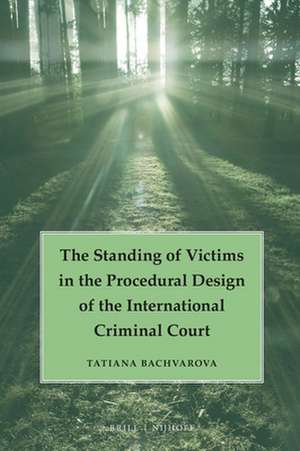The Standing of Victims in the Procedural Design of the International Criminal Court
Autor Tatiana Bachvarovaen Limba Engleză Hardback – 17 mai 2017
The author contributes to the existing debate in academia and in practice by delineating the core, most complex and contentious matters ensuing from the role assigned to victims. The scrupulously selected issues unveil and blueprint the essential characteristics that delimit the standing of victims as independent actors in the ICC’s arena, distinct from the parties and other non-party participants. As an integral part of the ICC’s synergy, victims converge and interact with its other components. Therefore, the position and role of victims are contemplated in the context of the Court’s procedural mechanism and the mission pursued by the parties and the Chamber.
The philosophy underpinning the ICC’s design and the standing of victims therein also requires analysis from a wider perspective. Accordingly, the volume draws an in-depth parallel with relevant developments and trends at the international and domestic level. Close attention is paid to the legal instruments and jurisprudence of international(ized) criminal justice bodies, human rights institutions and non-criminal jurisdictions to the extent useful for shedding further light on the issues at hand. Recourse is also made to various national systems, whenever relevant.
Preț: 661.27 lei
Preț vechi: 806.42 lei
-18% Nou
Puncte Express: 992
Preț estimativ în valută:
126.54€ • 135.31$ • 105.50£
126.54€ • 135.31$ • 105.50£
Carte indisponibilă temporar
Doresc să fiu notificat când acest titlu va fi disponibil:
Se trimite...
Preluare comenzi: 021 569.72.76
Specificații
ISBN-13: 9789004338609
ISBN-10: 9004338608
Pagini: 258
Dimensiuni: 155 x 235 x 22 mm
Greutate: 0.54 kg
Editura: Brill
Colecția Brill | Nijhoff
ISBN-10: 9004338608
Pagini: 258
Dimensiuni: 155 x 235 x 22 mm
Greutate: 0.54 kg
Editura: Brill
Colecția Brill | Nijhoff
Cuprins
Foreword William SchabasForeword Georghios M. Pikis/i>AcknowledgementsIntroduction 1 Victims’ Eligibility under Rule 85The Victim Definition and the Presumption of Innocence Application of Rule 85 The First Criterion: Natural Persons and Legal EntitiesNatural PersonsLegal PersonsThe Second Criterion: HarmDefinition of HarmTypes of HarmHarm Sustained by Legal PersonsThe Third Criterion: Jurisdiction The Fourth Criterion: Causal Link2 Classification of Victims’ RightsGeneral and Specific Rights Rights of Uniform Applicability and Case-dependent Rights Express and Implied Rights Imperative and Non-imperative Rights Conditional and Non-conditional Rights Passive and Active Rights; Rights of a Mixed Character Positive and Negative Rights Rights Employed in Person; Rights Exercised in Person and through Another; Rights Effectuated Exclusively through Another Any-victim Rights and Group-specific Rights Service Rights and Procedural Rights Exclusive and Non-exclusive Rights Rights Falling within Several Classifications3 Purpose and Quintessence of Article 68(3)Article 68(3) Participation Scheme and Existing Models of Victims’ Intervention icc’s Participatory Scheme and Intervention of Interested Persons in Ongoing Litigation Genesis and Overall Rationale of Article 68(3)‘Personal Interests’ RequirementThe Requirement ‘Are Affected’The ‘Appropriateness’ CriterionManner of ParticipationViews and Concerns4 Duality of Victim-Witness StatusDuality of Status at the Domestic Level Duality of Status at the International Level Duality of Status in the Context of Trials of Mass Atrocities Acquiring Duality of Status Applications for Participation and Written Statements; Disclosure-Related IssuesAccess to Victims’ Applications for Participation; Disclosure of Applications of Dual Status IndividualsViews and Concerns as Compared to Testimony Admissibility and Probative Value of the Testimony of Dual Status Individuals Impact of Information from Dual Status Individuals on Their Victim Standing and Trustworthiness Withdrawal of Victim Standing before Other Adjudicative Bodies. Consequences and Possible Remedies Practical Matters Occasioned by the Participation of Dual Status IndividualsRole of the Registry in the Protection of Dual Status IndividualsExchange of Information Concerning Dual Status IndividualsContact between Dual Status Individuals, the Parties and Other Participants5 icc’s Evidentiary Procedure and Victims’ Role ThereinThe Role of the Parties in the Processing of Evidence on the Merits of the Criminal Case The Role of the Chamber in the Fact-finding Mechanism Victims’ Role in the Fact-finding Process on the Merits of the Criminal Case The Essence of Reparation Proceedings in a Nutshell and Victims’ Role in Related Evidence GatheringConcluding RemarksIndex
Notă biografică
Dr. Tatiana Bachvarova is a legal scholar and consultant in international and comparative criminal justice, criminal procedure and evidence, and human rights law. She was a Judge at the Sofia District Court, Bulgaria (2007-2016). Dr. Bachvarova was a visiting professional at the Office of the Prosecutor of the International Criminal Court (2015) and took part in proceedings at the International Court of Justice (2013-2014). Prior to her position at the Sofia District Court, she completed her judicial training at the National Institute of Justice, Sofia, Bulgaria (2005) and worked as a Junior Judge at the Sofia City Court, Bulgaria (2005-2007).
She holds a Ph.D. from Middlesex University, London, UK (2015), an LL.M. from the London School of Economics and Political Science (LSE), UK (2009), and an LL.M. from Sofia University St. Kliment Ohridski, Bulgaria (2004).
Dr. Bachvarova was a member of the Bulgarian Judges Association and a referee of foreign judges within the European Judicial Training Network. She has been a guest lecturer and presenter on a number of occasions. Dr. Bachvarova is a member of the Editorial Board of International Law Research.
She has published in renowned international journals and collected volumes on diverse procedural and substantive issues in the realm of international criminal justice, comparative criminal law and procedure, the law of evidence and human rights.
She holds a Ph.D. from Middlesex University, London, UK (2015), an LL.M. from the London School of Economics and Political Science (LSE), UK (2009), and an LL.M. from Sofia University St. Kliment Ohridski, Bulgaria (2004).
Dr. Bachvarova was a member of the Bulgarian Judges Association and a referee of foreign judges within the European Judicial Training Network. She has been a guest lecturer and presenter on a number of occasions. Dr. Bachvarova is a member of the Editorial Board of International Law Research.
She has published in renowned international journals and collected volumes on diverse procedural and substantive issues in the realm of international criminal justice, comparative criminal law and procedure, the law of evidence and human rights.
